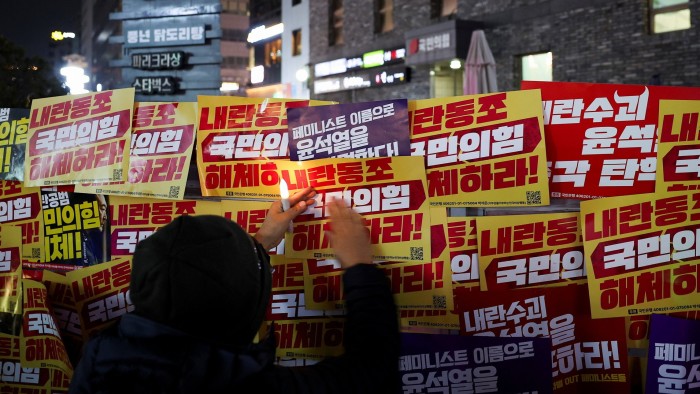Unlock the White House Watch newsletter for free
Your guide to what the 2024 US election means for Washington and the world
North Korea has slammed South Korean President Yoon Suk Yeol in Pyongyang’s first official comments on the political crisis in the neighbouring democracy after Yoon’s failed attempt to impose martial law last week.
“Puppet Yoon Suk Yeol, facing a serious crisis of governance and impeachment, has shocked the nation by suddenly declaring martial law and brazenly turning fascist dictatorial weapons against the citizens, throwing all of South Korea into chaos and pandemonium,” reported the Korean Central News Agency, the official mouthpiece of Kim Jong Un’s regime, according to a translation by NK News, a Seoul-based service.
Yoon is facing widespread calls for his impeachment after he declared martial law last Tuesday before being forced to rescind his declaration six hours later. He has already survived one vote to impeach him and is being investigated on treason charges.
The KCNA report featured prominently in North Korea’s main newspapers on Wednesday and was accompanied by photos of the massive public protests in the South Korean capital over the past week.
The report did not mention that Yoon sought to justify his martial law declaration by accusing South Korea’s leftwing majority in the National Assembly of plotting rebellion and harbouring North Korean sympathies.
While Pyongyang’s propagandists appear to be deriding the situation in South Korea for domestic purposes, analysts say it is impossible to predict whether North Korea will try to exacerbate instability in Seoul — potentially via nuclear weapons tests — or will show restraint ahead of the return to office of Donald Trump and possible resumption of negotiations with the US.
During his first term Trump became the first sitting president to visit North Korea, part of a period of unprecedented brinkmanship and negotiations between the leaders of North Korea and the US.
However, talks ultimately stalled and Washington’s nuclear negotiations with North Korea have been given a lower priority by Joe Biden’s administration, which has instead focused on combating the rise of China.
“The problem is that both Kim and Trump have tended to escalate, to negotiate, so even if we think maybe they are angling to restore talks, it doesn’t necessarily mean stabilisation,” said Andrew Gilholm, director of analysis for China and Korea at Control Risks, a geopolitical risk consultancy.
Uncertainty over how Trump will approach North Korea’s nuclear arsenal also comes amid rising concern over closer ties between Kim and Russian leader Vladimir Putin.
Nato last week accused Russia of assisting North Korea’s nuclear programme in exchange for Pyongyang sending troops to help its war against Ukraine.
Analysts also note that Lee Jae-myung, leader of South Korea’s opposition and frontrunner to be the next president, is likely to revert to a more conciliatory policy of engagement with North Korea, following in the footsteps of Yoon’s predecessor, Moon Jae-in.
Read the full article here




